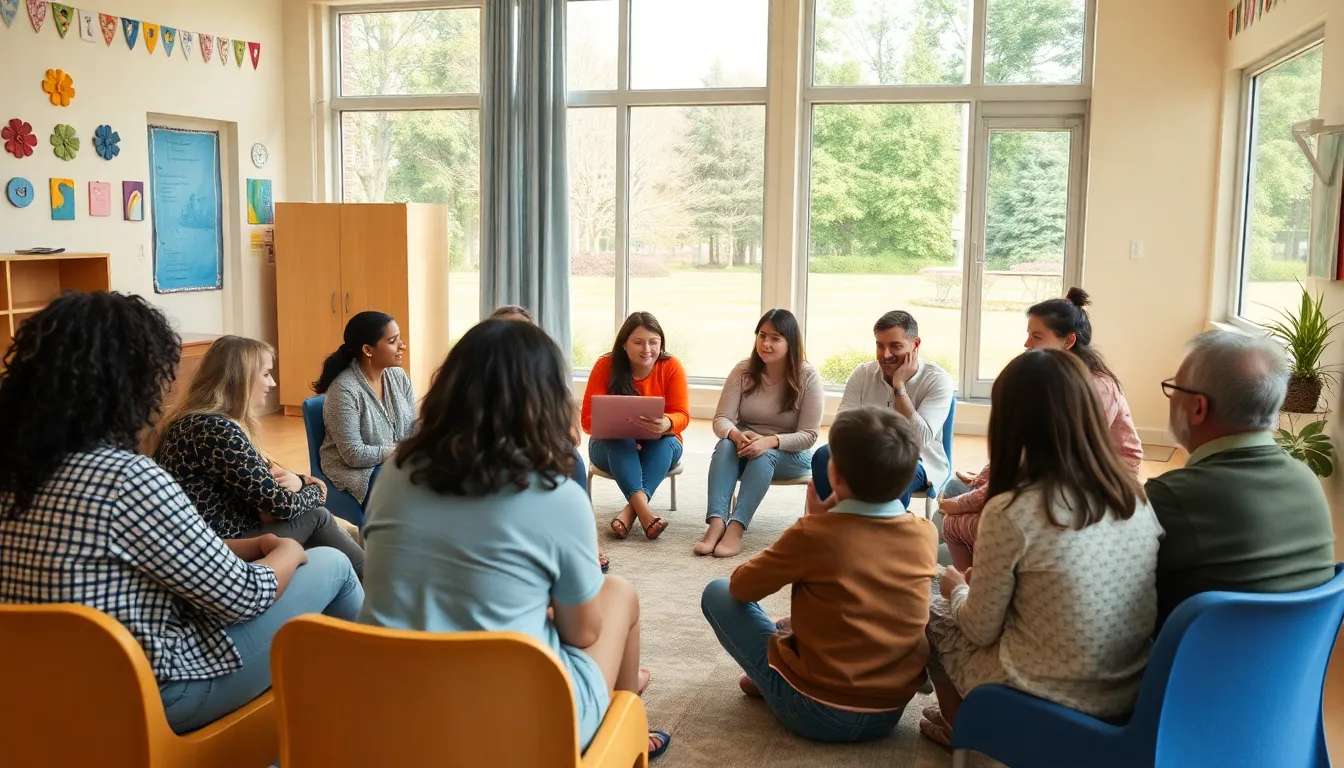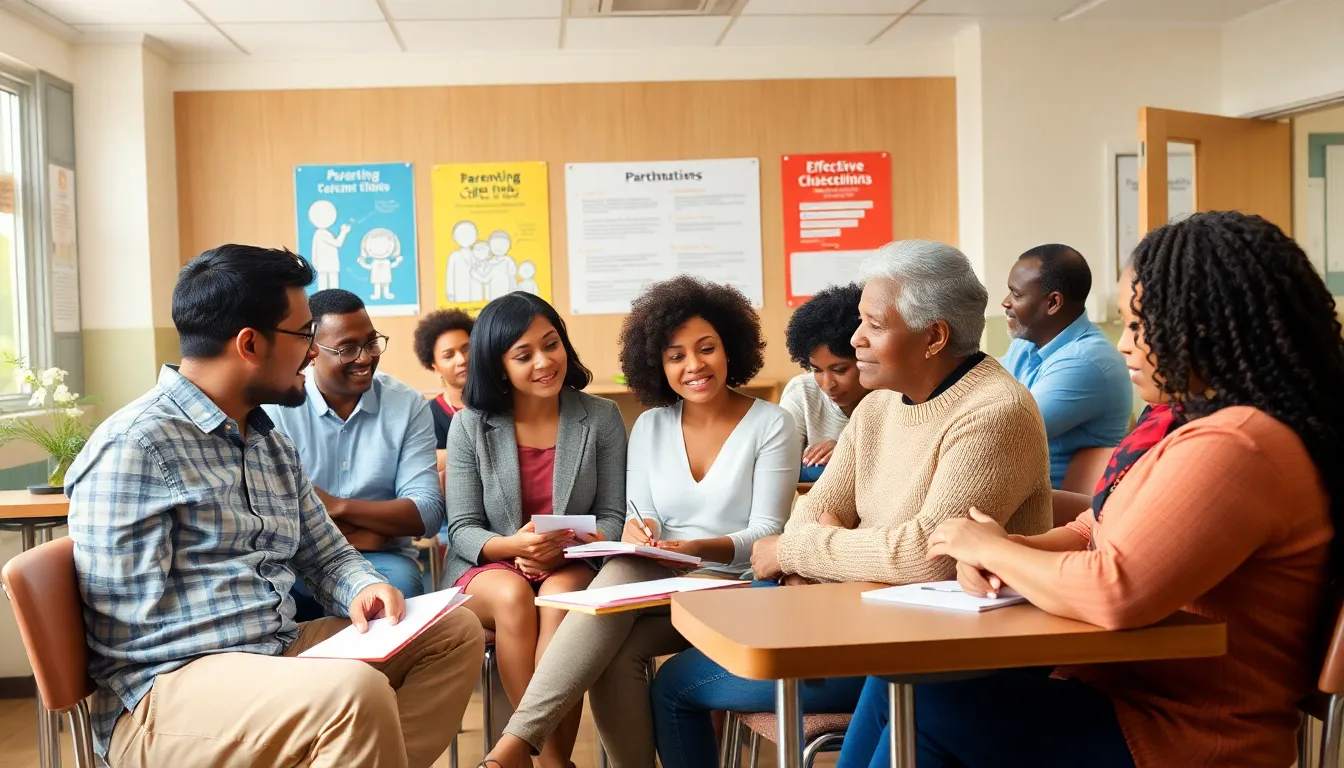Table of Contents
ToggleDivorce can feel like navigating a minefield—especially when kids are involved. As if untangling emotions and dividing assets isn’t enough, many states require parents to take parenting classes before finalizing their split. But why? It’s not just another tedious task on the to-do list; these classes serve a vital purpose.
Think of them as a crash course in co-parenting 101. They equip parents with the tools to manage their new family dynamics while keeping the kids’ best interests front and center. After all, no one wants to be that parent who thinks “sharing” means splitting dessert equally while forgetting about emotional support. So, let’s dive into why these classes are more than just a requirement—they’re a lifeline for families navigating the choppy waters of divorce.
Understanding Parenting Classes
Parenting classes serve a critical role in preparing individuals for effective co-parenting after divorce. These programs equip parents with essential skills to navigate the challenges that arise from changes in family dynamics.
Definition and Purpose
Parenting classes focus on teaching strategies for effective communication and conflict resolution. Their primary purpose is to enhance parenting skills, ensuring children’s emotional and psychological well-being. Classes address topics like child development, behavioral management, and methods for fostering a supportive environment. Equipped with this knowledge, parents improve their ability to cooperate, which ultimately benefits their children. Participants learn best practices to mitigate the impact of divorce on their kids, reinforcing positive co-parenting relationships.
Different Types of Parenting Classes
Various types of parenting classes exist, each tailored to specific needs. Some classes emphasize basic parenting techniques, while others focus on high-conflict situations where cooperation is especially crucial. Online classes offer flexibility, allowing parents to learn at their own pace. Workshops often provide personalized interactions with instructors, facilitating direct support. Furthermore, classes may cater to specific age groups, such as infants or teens, ensuring that content remains relevant. Therefore, parents choose classes based on their individual circumstances, enhancing their co-parenting effectiveness.
The Impact of Divorce on Children

Divorce significantly affects children’s emotional and psychological health. Children often experience feelings of anxiety, sadness, and confusion during this turbulent time. Dealing with changes in family structure can overwhelm them. Emotional responses may manifest in behavioral issues such as anger or withdrawal. Studies indicate that children from divorced families may struggle academically and socially due to these stressors. Moreover, parental conflicts frequently heighten children’s feelings of insecurity, making it crucial for parents to manage disputes constructively.
Co-parenting holds immense importance in navigating post-divorce life. Collaboration between parents can greatly reduce children’s stress and anxiety. Effective co-parenting ensures stability and promotes a sense of security for children during and after the transition. Children benefit from consistent routines and harmonious interactions between parents, which foster positive relationships. Research highlights that cooperative co-parenting positively influences children’s emotional development. Therefore, parenting classes equip parents with valuable skills to support healthy co-parenting strategies, ultimately safeguarding children’s well-being.
Legal Considerations
Legal frameworks often mandate parenting classes during divorce proceedings, especially when children are involved. Parents may encounter requirements that support an amicable transition.
Court-Ordered Parenting Classes
Court-ordered parenting classes aim to equip parents with necessary skills for co-parenting. Judges may mandate these classes to ensure children’s welfare. Completion of these programs often appears as a precondition for finalizing divorce decrees. They encompass various topics like communication strategies and conflict resolution. This structured approach ensures parents learn to prioritize their children’s emotional health effectively.
Requirements in Different States
State laws dictate distinct requirements for parenting classes. For instance, some states enforce mandatory attendance while others allow flexibility in class selection. Certain jurisdictions may offer online options, accommodating different schedules. Requirements may vary based on custody arrangements, emphasizing the importance of compliance. Understanding each state’s regulations helps parents navigate the process and fulfill their responsibilities efficiently.
Benefits of Parenting Classes
Parenting classes provide essential skills for parents navigating divorce. These classes foster better communication and conflict resolution, significantly impacting co-parenting relationships.
Improved Communication Skills
Effective communication forms the foundation of successful co-parenting. Parents learn how to express their thoughts and feelings clearly. Engaging in class discussions often leads to improved understanding of children’s needs. Practicing active listening strengthens the relationship between co-parents. Positive communication enhances cooperation during transitions. The ability to articulate concerns leads to timely problem-solving. Enhanced communication reduces misunderstandings, creating a more stable environment for children.
Conflict Resolution Techniques
Parents face inevitable conflicts during and after divorce. Learning conflict resolution techniques equips them to manage disputes constructively. Classes teach strategies like negotiation and compromise, promoting collaborative solutions. Understanding emotional triggers helps parents respond calmly during disagreements. This training emphasizes finding common ground for the children’s benefit. Applying these techniques leads to less heated arguments and more peaceful interactions. Ultimately, mastering conflict resolution fosters a healthier co-parenting dynamic that supports children’s emotional well-being.
Parenting classes are vital for parents navigating the complexities of divorce. They equip individuals with essential skills for effective co-parenting and enhance communication strategies. By prioritizing children’s emotional and psychological well-being, these classes foster a supportive environment during a challenging transition.
The legal requirements surrounding parenting classes further underscore their importance. Courts recognize the necessity of these programs in promoting healthier family dynamics post-divorce. Ultimately, investing time in parenting classes can significantly improve co-parenting relationships, ensuring that children thrive amidst the changes in their family structure.




